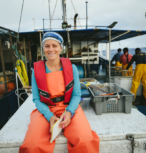DNA reveals the past and future of coral reefs
New DNA techniques are being used to understand how coral reacted to the end of the last ice age in order to better predict how they will cope with current changes to the climate. James Cook Univer

From 2005 to 2022, the main node of the ARC Centre of Excellence for Coral Reef Studies was headquartered at James Cook University in Townsville, Queensland (Australia)








Abstract: Oceanic shark populations have declined 77% over the past 60 years as a result of overexploitation in fisheries. However, sustainable shark management is limited to a few developed nations that have the capacity to implement sophisticated fisheries management. Developing nations are limited by a lack of data, funding, and capacity. These recognized limitations have resulted in the widespread use of spatial management due to ease of implementation, including marine protected areas (MPAs) and closures to commercial retention of sharks across exclusive economic zones, defined as shark sanctuaries. Global shark sanctuaries cover 19 million square kilometers of ocean, covering 5% of the world’s oceans, with 88% of sanctuary area in the waters of Pacific island nations. Despite their widespread coverage, no study has evaluated the effectiveness of sanctuaries on the wide-ranging species they are meant to protect. This thesis explored the effectiveness of shark sanctuaries on wide-ranging sharks through a multidisciplinary approach, using a case study in the Cook Islands (1.997 million km2). This seminar will focus on my investigations by: (1) identifying gaps and inconsistencies in global shark policies that may preclude mortality reduction in wide-ranging sharks; (2) identifying habitat linkages between pelagic and reef sharks, and identifying the drivers of abundance in areas that are fished by local vessels; (3) understanding whether implementation of the sanctuary lead to changes in industrial fishing behavior, and (4) examining movement ecology of wide-ranging sharks associated with industrial fisheries to determine benefits derived from an individual shark sanctuary.
Biography: Jess Cramp is originally from the landlocked Pocono Mountains in Pennsylvania, USA, but now happily resides on a tiny Pacific island surrounded by water. Jess co-championed a grassroots campaign that resulted in the Cook Islands Shark Sanctuary in 2012, during which she realized there were research gaps, including a lack of effectiveness evaluations on many marine conservation and fisheries policies. Before embarking on a PhD, she transitioned from a drug discovery biologist to a marine biologist, fulfilling a lifelong dream. She’s led marine research expeditions through small Pacific islands and improved her surfing and freediving abilities while working with governments, fishers and community members on marine conservation throughout the region. She is currently a PhD candidate at the Australian Research Council Centre of Excellence (ARC CoE) for Coral Reef Studies and the Centre for Sustainable Tropical Fisheries and Aquaculture at James Cook University under the supervision of Professor Bob Pressey, Professor Colin Simpfendorfer and Dr. Michelle Heupel. Jess’ thesis evaluates the effectiveness of large-scale marine reserves on wide-ranging sharks through a case study of the Cook Islands Shark Sanctuary. She is the founder and executive director of Sharks Pacific, a non-profit organization that conducts research, outreach and advocacy throughout the Pacific Islands region. Her work focuses on the development of effective conservation policies through improving fisheries management, human-wildlife conflict prevention, community empowerment, and the consideration of people and the environment in equal measure. Jess was named a National Geographic Emerging Explorer in 2015 and an AAAS If/Then Ambassador in 2019.
New DNA techniques are being used to understand how coral reacted to the end of the last ice age in order to better predict how they will cope with current changes to the climate. James Cook Univer
A new study on the effects of climate change in five tropical countries has found fisheries are in more trouble than agriculture, and poor people are in the most danger. Distinguished Profess
James Cook University researchers have found brightly coloured fish are becoming increasingly rare as coral declines, with the phenomenon likely to get worse in the future. Christopher Hemingson, a
Researchers working with stakeholders in the Great Barrier Reef region have come up with ideas on how groups responsible for looking after the reef can operate more effectively when the next bleaching
Abstract: As marine species adapt to climate change, their heat tolerance will likely be under strong selection. Individual variation in heat tolerance and its heritability underpin the potential fo
Abstract: The Reef Ecology Lab in KAUST’s Red Sea Research Center explores many aspects of movement ecology of marine organisms, ranging from adult migrations to intergenerational larval dispersal
Abstract: Macroalgal meadows are a prominent, yet often maligned component of the tropical seascape. Our work at Ningaloo reef in WA demonstrate that canopy forming macroalgae provide habitat for ad
Abstract: Sharks are generally perceived as strong and fearsome animals. With fossils dating back at least 420 million years, sharks are not only majestic top predators but they also outlived dinosa
Abstract: Connectivity plays a vital role in many ecosystems through its effects on fundamental ecological and evolutionary processes. Its consequences for populations and metapopulations have been
Abstract: Evolution of many eukaryotic organisms is affected by interactions with microbes. Microbial symbioses can ultimately reflect host’s diet, habitat range, and even body shape. However, how
Abstract: The past few years have seen unprecedented coral bleaching and mortality on the Great Barrier Reef (GBR) but the consequences of this on biodiversity are not yet known. This talk will expl